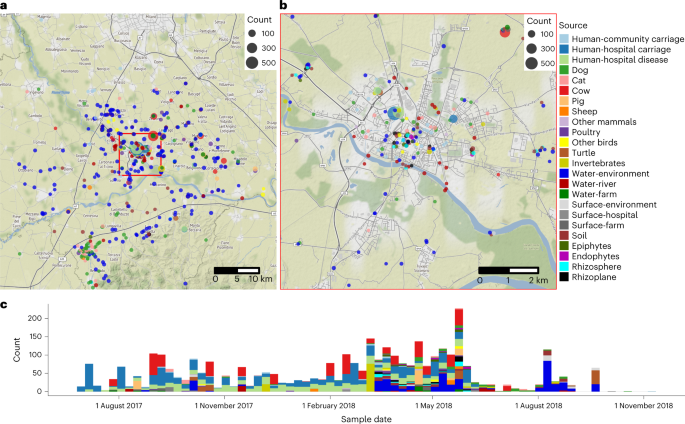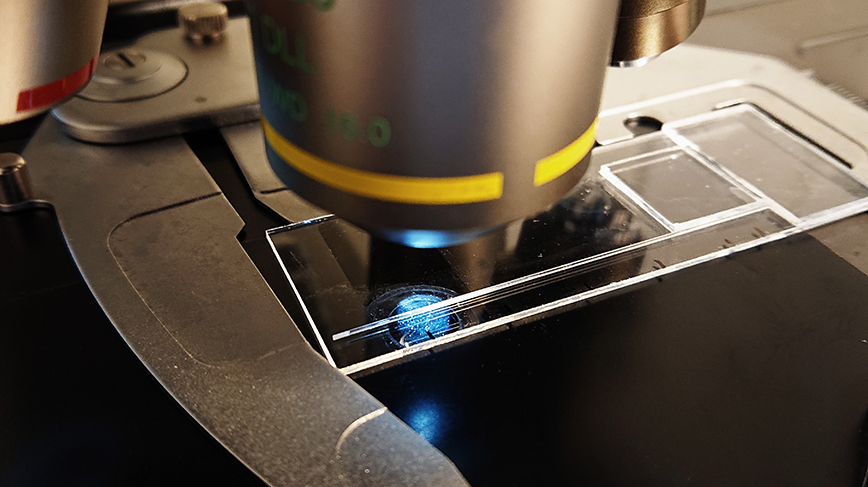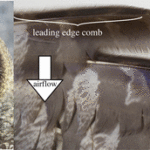2022-11-28 バース大学
英国では、抗生物質使用量の約3分の1が農業に使用されており、世界的にはこの数字はもっと高い。基本的に、同じ抗生物質が人間と動物の治療に使用されているため、耐性菌が農場で進化し、より広い環境を汚染し、最終的に人間に感染して深刻な感染症を引き起こす恐れがあるのだ。
研究者たちは、北イタリアの都市パヴィアとその周辺で、臨床、地域、獣医、農業、野生動物、環境など、さまざまな場所から18カ月以内に採取した6,500件のサンプルから、これらの細菌を分離した。
また、この地域の病院では、カルバペネム系抗生物質(他のすべての抗生物質が効かない場合にのみ使用される「最後の手段」の抗生物質)に耐性を持つK. pnuemoniae株が大きな問題となっており、この耐性株が病院外でも生存しているかどうかも明らかにされた。
この研究では、2つの明確な結論が得られた。まず、カルバペネム耐性株が病院の外に出ている証拠は、ゲノムデータからも、菌を直接検査した結果からも見つからなかった。このことは、抗生物質が存在しない場合に細菌が他の株と競争できなくなるような、耐性に対するコストが存在する可能性を示している。コストとは、細菌が戦闘中でないときは常に完全な鎧を身に着けていなければならないことだと考えてもよいでしょう。
第二に、人間は動物や環境からではなく、ほとんどの場合、他の人間からこれらの細菌を感染させる。同様に、牛は他の牛に、植物は他の植物に感染することがほとんどである。
この研究は、公衆衛生上の観点から、当面の公衆のリスクは、標準的な衛生対策や、汚染された水での水泳など暴露リスクの高い活動を避けることでほぼ軽減されることを意味しており、安心できるものである。
<関連情報>
- https://theconversation.com/superbugs-in-the-environment-rarely-transfer-to-humans-new-study-195075
- https://www.nature.com/articles/s41564-022-01263-0
北イタリアで分離されたKlebsiella属菌の大規模なゲノムスナップショットにより、臨床環境と非臨床環境間の伝播が限定的であることが判明 A large-scale genomic snapshot of Klebsiella spp. isolates in Northern Italy reveals limited transmission between clinical and non-clinical settings
Harry A. Thorpe,Ross Booton,Teemu Kallonen,Marjorie J. Gibbon,Natacha Couto,Virginie Passet,Sebastián López-Fernández,Carla Rodrigues,Louise Matthews,Sonia Mitchell,Richard Reeve,Sophia David,Cristina Merla,Marta Corbella,Carolina Ferrari,Francesco Comandatore,Piero Marone,Sylvain Brisse,Davide Sassera,Jukka Corander & Edward J. Feil
Nature Microbiology Published21 November 2022
DOIhttps://doi.org/10.1038/s41564-022-01263-0

Abstract
The Klebsiella group, found in humans, livestock, plants, soil, water and wild animals, is genetically and ecologically diverse. Many species are opportunistic pathogens and can harbour diverse classes of antimicrobial resistance genes. Healthcare-associated Klebsiella pneumoniae clones that are non-susceptible to carbapenems can spread rapidly, representing a high public health burden. Here we report an analysis of 3,482 genome sequences representing 15 Klebsiella species sampled over a 17-month period from a wide range of clinical, community, animal and environmental settings in and around the Italian city of Pavia. Northern Italy is a hotspot for hospital-acquired carbapenem non-susceptible Klebsiella and thus a pertinent setting to examine the overlap between isolates in clinical and non-clinical settings. We found no genotypic or phenotypic evidence for non-susceptibility to carbapenems outside the clinical environment. Although we noted occasional transmission between clinical and non-clinical settings, our data point to a limited role of animal and environmental reservoirs in the human acquisition of Klebsiella spp. We also provide a detailed genus-wide view of genomic diversity and population structure, including the identification of new groups.


